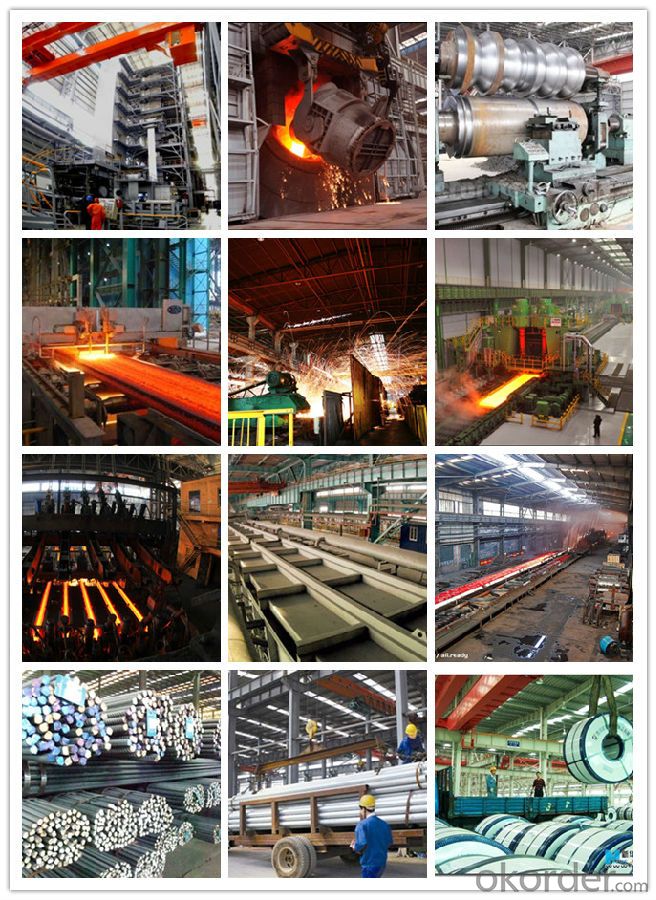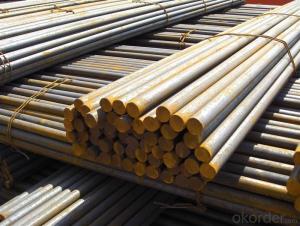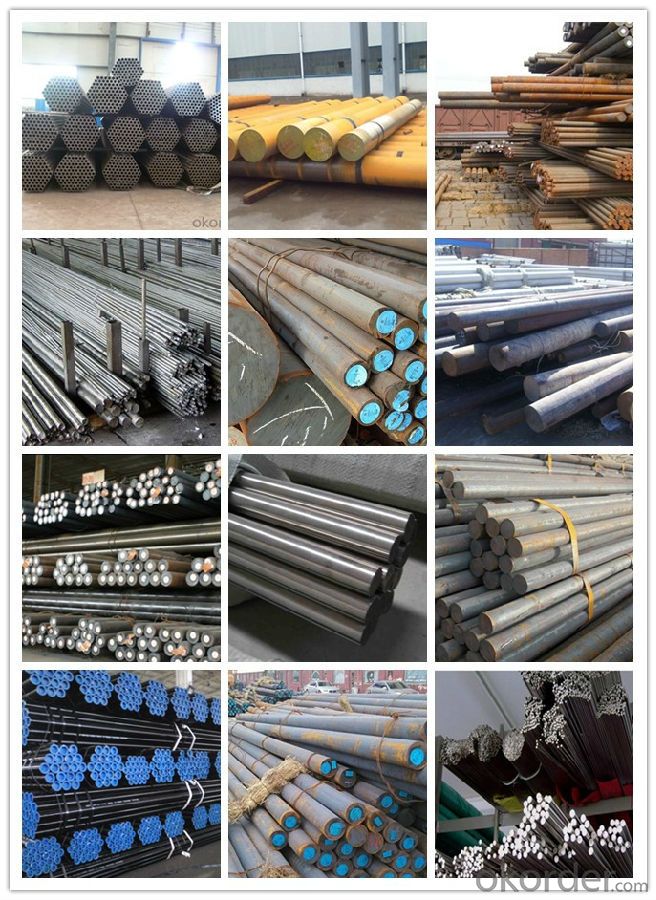Structural Alloy Steel Round Bar S235JR Special Steel
- Loading Port:
- China main port
- Payment Terms:
- TT OR LC
- Min Order Qty:
- 30 m.t.
- Supply Capability:
- 10000 m.t./month
OKorder Service Pledge
OKorder Financial Service
You Might Also Like
Item specifice
Structural alloy steel round bar s235jr
Characteristics
1) Even material.
2) Good machinability and polishability.
3) High toughness and high plasticity.
4) High abrasive resistance in high temperature.
5) Excellent total hardenability.
6) Low deformability during heat treatment.
7) Better isotropy.
Application
1) Diecasting mould(mold, fixed block, upper die, jet nozzle, nitride thimble ).
2) Extrusion die(mold, supporting member, choke blocks).
3) Hot press die. (aluminum, magnesium, copper alloy)
4) Parts, such as cold cutting, overlap, hot shears, wearable parts.
5) Important parts for aviation industry.
Main Product
Carbon Steel Round Bar | SS400, S235JR,Q235, ASTM A36, Fe360A, Fe360B,SM400A,080A15, SS41,E235B |
SAE 1020, AISI 1020, ASTM 1020, S20C, 20#, 050A20 | |
SAE 1045, AISI 1045, ASTM 1045, S45C, 45#,EN8, XC45, XC48, 45B, C45, CK45, CM45, 060A47, R683/IC45e | |
Alloy Steel Round Bar | 40Cr, DIN 1.7035, SAE 5140, AISI 5140, ASTM 5140, SCr440, 41Cr4, 530A40, 42Cr4, 40X, R683/VII3 |
SAE4140,42CrMo, 42CrMo4, DIN 1.7225, SCM440,EN19, 42CD4, 708M40, R683/II3 | |
SAE 4340, 40CrNiMoA, EN24, SNCM439, 817M40,40XMA, R683/III4 | |
SAE 8620,,AISI 8620, ASTM 8620, 20CrNiMo,SNCM220, 805M20 | |
SAE52100, AISI52100,ASTM E52100, GCr15, SUJ2, 100C6, 100Cr6, 1.3505, 534A99, IIIX15 |
Product show
Workshop show

Shipping
1. FedEx/DHL/UPS/TNT for samples, Door-to-Door;
2. By Air or by Sea for batch goods, for FCL; Airport/ Port receiving;
3. Customers specifying freight forwarders or negotiable shipping methods!
Delivery Time: 3-7 days for samples; 5-25 days for batch goods.
Payment Terms
1.Payment: T/T, L/C, Western Union, MoneyGram,PayPal; 30% deposits; 70% balance before delivery.
2.MOQ: 1pcs
3.Warranty : 3 years
4.Package Informations: 1) EXPORT, In 20 feet (GW 25 ton) or 40 feet Container (GW 25 ton)
2)as customer's requirement
Why choose us?
(1) The leading exporter in China special steel industry.
(2) Large stocks for various sizes, fast delivery date.
(3) Good business relationship with China famous factories.
(4) More than 7 years steel exporting experience.
(5) Good after-sales service guarantee.
- Q:How does special steel contribute to the chemical processing aftermarket industry?
- Special steel plays a crucial role in the chemical processing aftermarket industry by offering exceptional resistance to corrosion, high temperatures, and pressure. Its unique properties enable the production of high-quality and durable equipment such as valves, pumps, pipes, and heat exchangers. This ensures the safe and efficient handling of corrosive chemicals, thereby reducing maintenance costs, preventing leaks, and minimizing production downtime. Overall, special steel enhances the reliability, longevity, and performance of chemical processing equipment, making it an indispensable component of the aftermarket industry.
- Q:How is nitriding steel used in the production of tools and dies?
- Nitriding steel is used in the production of tools and dies through a process called nitriding. This involves introducing nitrogen into the surface of the steel, which forms a hard layer of nitrides, increasing the overall hardness, wear resistance, and corrosion resistance of the material. This enhanced surface hardness makes the tools and dies more durable and long-lasting, allowing them to withstand the high stresses and temperatures experienced during cutting, forming, and shaping processes. Additionally, nitriding steel can also improve the fatigue strength and reduce the friction of the tools and dies, enhancing their performance and efficiency in various industrial applications.
- Q:How does special steel contribute to the medical aftermarket industry?
- The medical aftermarket industry heavily relies on special steel, which is essential for producing top-quality materials needed for medical devices and equipment. Special steel, also known as stainless steel, offers a wide range of advantages that make it perfect for medical applications. Above all, special steel's resistance to corrosion and rust is of utmost importance in the medical field, where hygiene and cleanliness are crucial. Medical devices like surgical instruments, implants, and equipment require frequent sterilization, and the corrosion resistance of special steel guarantees their durability and long-lasting nature. Moreover, special steel possesses exceptional strength and hardness properties, making it suitable for medical implants and prosthetics. These implants must be able to withstand the stresses and strains of the human body while maintaining their structural integrity. Special steel provides the necessary strength and toughness required for these critical applications. Furthermore, special steel is biocompatible, meaning it does not cause any negative reactions or toxicity when it comes into contact with living tissues. This characteristic is vital for implants and devices that directly interact with the human body, as it minimizes the risk of rejection or allergic reactions. Additionally, special steel's versatility allows for easy machining and fabrication into complex shapes and sizes, meeting the diverse requirements of medical applications. It can be shaped into delicate surgical instruments, precise cutting tools, and even large-scale equipment like hospital beds and imaging machines. The high precision and dimensional stability of special steel contribute to the accuracy and reliability of medical devices, especially in areas like diagnostics and imaging. Precise measurements and high-quality images are essential for accurate diagnosis and treatment planning, and special steel helps achieve these goals. In conclusion, special steel's corrosion resistance, strength, biocompatibility, and versatility make it an invaluable material in the medical aftermarket industry. Its use in manufacturing medical devices and equipment ensures the highest standards of hygiene, durability, and performance, ultimately contributing to the advancement of healthcare and improving patient outcomes.
- Q:What are the properties of high-strength tool steel?
- High-strength tool steel possesses excellent hardness, wear resistance, and toughness. It has the ability to retain its sharpness, withstand high temperatures, and resist deformation. This type of steel is also known for its high strength-to-weight ratio, making it ideal for heavy-duty applications in industries such as manufacturing and construction.
- Q:How does special steel contribute to the aerospace aftermarket industry?
- The aerospace aftermarket industry heavily relies on special steel to provide critical components that are vital for the safe and efficient operation of aircraft. Special steel possesses high strength, durability, and temperature resistance, making it an ideal material for a wide range of aerospace applications. Engine components are primarily manufactured using special steel, particularly nickel-based superalloys. These alloys are used to produce turbine blades, compressor discs, and shafts, which are essential elements of jet engines. These components must be able to withstand extreme temperatures, pressures, and mechanical stresses, and special steel alloys offer the necessary properties to ensure reliable and long-lasting performance. Special steel is also utilized in the production of structural components in aircraft. Steel alloys with high strength-to-weight ratios, such as titanium alloys, are employed to construct critical parts like landing gear, wing spars, and fuselage frames. These components need to be lightweight yet strong enough to endure the forces and stresses experienced during flight. Special steel alloys provide the required mechanical properties to ensure the structural integrity and safety of the aircraft. In addition to engine and structural components, special steel is crucial for the production of fasteners, bearings, and other small but vital parts. These components play a significant role in holding various parts together and ensuring the proper functioning of systems. Special steel alloys with exceptional corrosion resistance, fatigue strength, and wear resistance are used to guarantee the reliability and longevity of these critical components. Furthermore, special steel plays a vital role in the maintenance, repair, and overhaul (MRO) activities of the aerospace aftermarket industry. Due to the rigorous demands placed on aircraft components, regular inspections, repairs, and replacements are necessary to maintain their airworthiness. Special steel materials are commonly used for MRO purposes because they are compatible with existing aircraft systems and can meet the stringent requirements of aerospace regulations. Overall, special steel is an indispensable material in the aerospace aftermarket industry. Its unique properties and characteristics enable the production of high-performance engine components, lightweight structural parts, and reliable small components. The use of special steel ensures the safety, efficiency, and longevity of aircraft, contributing to the overall success and growth of the aerospace aftermarket industry.
- Q:Can special steel be used in the defense sector?
- Yes, special steel can be used in the defense sector. Special steel alloys and compositions offer enhanced strength, hardness, corrosion resistance, and other desirable properties, making them suitable for various military applications. These include armor plating, missile casings, gun barrels, aircraft components, and naval vessels. Special steel's high performance and durability make it an important material in the defense sector.
- Q:How is wear-resistant stainless steel used in the production of cutting tools?
- Wear-resistant stainless steel is commonly used in the production of cutting tools due to its high hardness and resistance to wear and corrosion. This steel alloy is essential for making durable and long-lasting cutting tools, such as knives, blades, drills, and saws. The wear resistance of stainless steel ensures that these tools can withstand the friction and abrasion involved in cutting various materials, leading to improved performance and extended tool life.
- Q:What are the factors affecting the machinability of special steel?
- The machinability of special steel can be influenced by a variety of factors. 1. The composition of special steel plays a significant role in its machinability. Certain alloying elements, such as sulfur and lead, can enhance machinability by creating free-cutting properties. Conversely, elements like chromium and nickel can make the steel more difficult to machine. 2. Machinability can also be affected by the hardness of the special steel. As the hardness increases, the steel becomes more challenging to machine. Harder steel requires higher cutting forces, which can lead to increased tool wear and slower machining speeds. 3. The microstructure of special steel, including grain size and distribution, can have an impact on machinability. Fine-grained steels generally exhibit better machinability compared to coarse-grained ones. Additionally, the presence of certain phases, such as carbides, can pose challenges during machining. 4. The heat treatment process applied to special steel can influence its machinability. Certain heat treatments, such as annealing or stress relieving, can improve machinability by reducing hardness and internal stresses. Conversely, hardening treatments can increase hardness, making the steel more difficult to machine. 5. Machinability can also be affected by the choice of cutting conditions. Factors such as cutting speed, feed rate, and depth of cut need to be optimized to balance productivity and tool life. Inadequate cutting conditions can result in excessive tool wear, poor surface finish, and reduced machining efficiency. 6. The selection of cutting tools is critical for achieving good machinability in special steel. The tool material must possess appropriate hardness, toughness, and wear resistance to withstand the cutting forces generated during machining. The tool geometry, including rake angle and relief angle, also influences chip formation and heat dissipation, thereby impacting machinability. 7. Proper lubrication and cooling methods are essential for achieving good machinability. Lubricants help reduce friction and heat generation during machining, while cooling methods, such as flood cooling or misting, can dissipate heat and prolong tool life. Insufficient lubrication or cooling can result in increased tool wear, surface finish issues, and reduced machinability. In conclusion, achieving improved machinability and productivity in machining special steels requires a comprehensive understanding and optimization of factors related to composition, microstructure, heat treatment, cutting conditions, tooling, and cooling methods.
- Q:What are the main applications of special steel in the semiconductor industry?
- Special steel finds various applications in the semiconductor industry, primarily in the manufacturing of critical components such as chambers, wafer carriers, and vacuum systems. Due to its high strength, corrosion resistance, and thermal stability, special steel is ideal for creating these parts that require durability and precision in maintaining the controlled environments necessary for semiconductor production. Additionally, special steel is also used in the fabrication of cutting tools and molds for semiconductor device manufacturing, further highlighting its importance in this industry.
- Q:How does special steel ensure dimensional stability?
- Special steel ensures dimensional stability through various mechanisms. Firstly, special steel is known for its high strength and toughness, which allows it to withstand external forces and prevent deformation. This is particularly important in applications where dimensional accuracy is crucial, such as in precision machinery or tooling. Additionally, special steel undergoes specific heat treatment processes to enhance its dimensional stability. For instance, quenching and tempering treatments are commonly applied to increase the steel's hardness and resistance to wear, while minimizing the risk of warping or distortion. These treatments also help to maintain the steel's shape and size over time, even under fluctuating temperature conditions. Moreover, special steel often contains alloying elements such as chromium, nickel, or molybdenum, which contribute to its corrosion resistance. By preventing oxidation and rusting, these alloying elements help to preserve the steel's dimensional stability by preventing any deterioration or loss of material due to corrosion. Furthermore, the manufacturing process of special steel involves strict quality control measures to ensure consistent dimensional accuracy. This includes precise control of the composition, refining techniques, and casting or forging processes. By maintaining tight tolerances during production, special steel can achieve the desired dimensional stability required for specific applications. In summary, special steel ensures dimensional stability through its high strength, heat treatment processes, alloying elements for corrosion resistance, and strict quality control during manufacturing. These factors collectively contribute to maintaining the steel's shape, size, and accuracy over time.
1. Manufacturer Overview |
|
|---|---|
| Location | |
| Year Established | |
| Annual Output Value | |
| Main Markets | |
| Company Certifications | |
2. Manufacturer Certificates |
|
|---|---|
| a) Certification Name | |
| Range | |
| Reference | |
| Validity Period | |
3. Manufacturer Capability |
|
|---|---|
| a)Trade Capacity | |
| Nearest Port | |
| Export Percentage | |
| No.of Employees in Trade Department | |
| Language Spoken: | |
| b)Factory Information | |
| Factory Size: | |
| No. of Production Lines | |
| Contract Manufacturing | |
| Product Price Range | |
Send your message to us
Structural Alloy Steel Round Bar S235JR Special Steel
- Loading Port:
- China main port
- Payment Terms:
- TT OR LC
- Min Order Qty:
- 30 m.t.
- Supply Capability:
- 10000 m.t./month
OKorder Service Pledge
OKorder Financial Service
Similar products
New products
Hot products
Related keywords
































